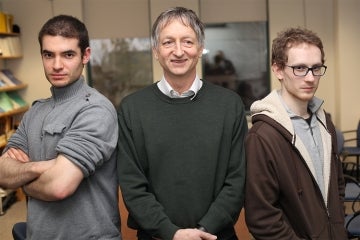Meet U of T's four Schulich Leaders who want to make a difference on campus and in the world
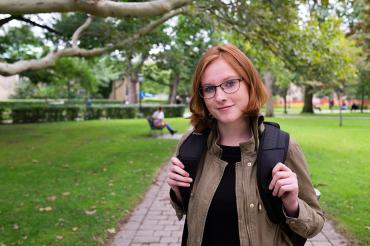
Published: September 17, 2018
The four students who come to the University of Toronto with prestigious Schulich Leader Scholarships haven’t known each other long, but they appear to be fast friends after going out for sushi during their first weekend in Toronto.
“We all vibed so well,” says Sidrah Rana, a science student and Schulich Leader at U of T's Trinity College. “I've never had such a good dynamic with people after a first meeting.”
They have similar interests, having all come to U of T on the scholarship for STEM (Science, Technology, Engineering and Mathematics) students, but they also seem to share a desire to make the world a better place – whether through biomedical innovation or political leadership.
The U of T Schulich Leaders are among just 50 high school graduates across Canada who received the scholarship, an initative of business leader and philanthropist Seymour Schulich. “The students will make great contributions to society, both on a national and global scale," says Schulich. "With their university expenses covered, they can focus their time on their studies, research projects, extracurricular, and entrepreneurial ventures.
"They are the next generation of technology innovators."
The scholarship is valued at $100,000 for undergraduate studies in engineering, and $80,000 for students in science or mathematics.
The four high-achievers spoke to U of T News as they began their undergraduate journeys.
Sidrah Rana
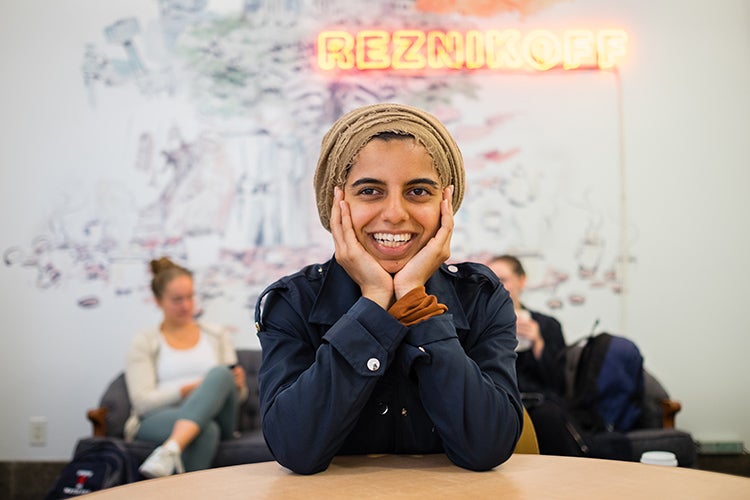
Schulich Leader Sidrah Rana at Café Reznikoff on the downtown Toronto campus (photo by Geoffrey Vendeville)
There's something Sidrah Rana wants you to know about her: She's not perfect. She's open about having overcome self-doubt and insecurities to get where she is today – a scholarship-winning science student.
She grew up in Mississauga and comes to U of T, with her identical twin sister, from White Oaks Secondary School in Oakville, Ont., where she graduated from the demanding international baccalaureate program.
Straight As didn't always come easily to Rana. Science wasn't her forté, and math didn't come naturally to her, she says. In fact, a middle school teacher appeared surprised when Rana said she would be taking science in university.
“I was constantly being put down by other people and told I wouldn't go anywhere,” she says. “My goal was to prove them wrong and get good grades. Not only that, I also wanted to show I could accomplish things outside of school.”
Rana's marks improved dramatically when she realized that she learns differently from many of her peers. While some students can memorize an equation and apply it, Rana says she has to understand the bigger picture and the fundamentals behind a theory in order to know how to use it.
In her free time, she writes short fiction as a creative outlet.
She's eager to get involved in research in university and delve deeper into the subjects that interest her, particularly astronomy, physics and chemistry.
Eli Scott
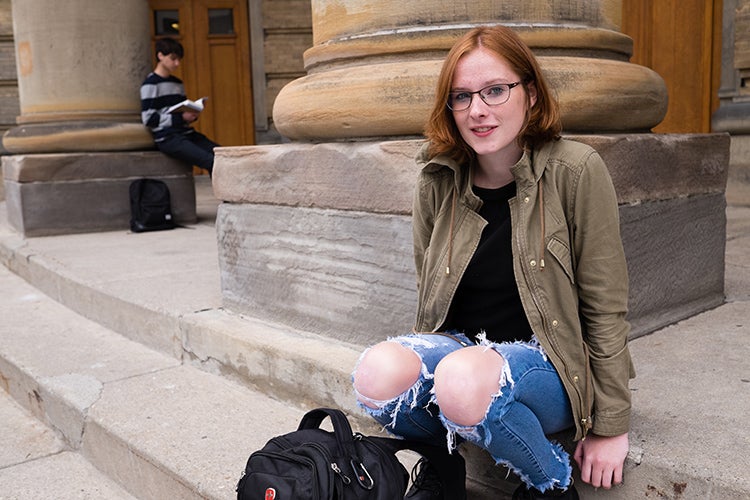
Eli Scott, an engineering science student and Schulich Leader, at Convocation Hall on the downtown Toronto campus (photo by Geoffrey Vendeville)
Eli Scott swapped life on a 50-acre farm, where she could walk for kilometres and still be at home, for a shared dorm room at U of T's Chestnut Residence in downtown Toronto. She credits her duties at home in Renfrew, Ont., in the Ottawa Valley – where she helped care for her grandfather's sheep and three horses named Tanzee, Quinn and Ellie – for teaching her discipline.
“You're getting up at 6 a.m., feeding the horses, or driving to grandpa's to feed the sheep, take the sheep to the sale barn on Mondays,” she says. Asked if university will be a breeze after that, she says without missing a beat: “It definitely smells nicer.”
Scott chose a different path than her parents, who are both English teachers. She's one of only 25 students across the country to have won a Schulich Leader Scholarship in engineering, and is enrolled in U of T's rigorous engineering science program.
Scott was a diligent student in high school at Renfrew Collegiate Institute, her mother Kim Acres told a local newspaper. “Despite the pressures of adolescence and life, Eli has never let her academics take the back seat, often working hours each night on homework and assignments.”
She plays hockey and basketball, and has supported special education programs, including the Special Olympics and a peer-interaction program.
She's thinking about specializing in biomedical engineering, but hasn't made up her mind and is even considering a career in politics or policy-making. “I guess it's a cliché but I want to make a difference in whatever way I'm the most useful,” she says.
Daniel Hoogsteen
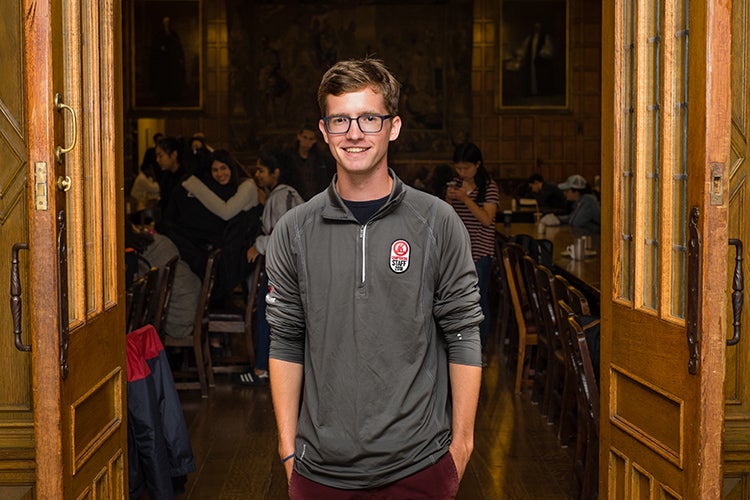
Daniel Hoogsteen, a Schulich Leader who intends to study math and physics at U of T, at the Trinity College dining room (photo by Geoffrey Vendeville)
Daniel Hoogsteen has Dutch ancestry, but his first visit to the Netherlands came in 2015 when he was part of the celebrations marking the 70th anniversary of VE-Day and the Canadian liberation of the country. In Wageningen, he marched with the Burlington Teen Tour Band past cheering crowds and Canadian and Dutch dignitaries, including Prime Minister Stephen Harper and the Dutch royal family.
“There’s a different kind of energy there,” he recalls. “Still 70 years later, they were very thankful to the Canadian people for the sacrifices of the troops to liberate them at the end of the Second World War and have so much appreciation for Canadians.”
He played the sax with the Nelson High School band, from Burlington, Ont. They were hard to miss in their red band jackets with a maple leaf on the back. “It was almost like being a celebrity,” he says.
Hoogsteen also plays the bagpipes, but his neighbours in St. Hilda's residence at Trinity College may be relieved to know he's left them at home for now.
In addition to music, he's passionate about math and science. “I've always loved numbers and the way they can quantify and express the world around us,” he says. He intends to study math and physics at U of T, and wants to get involved in student government.
“Having a chance to exercise your opinions and your voice is important,” he says. “It's a skill set that comes fairly naturally to me — not just leadership, but advocacy.” He has served as a page at Queen's Park and on youth advisory councils for his MPP Eleanor McMahon and MP Karina Gould, working on sustainable energy, bike lanes and mental health.
He says he helped start a scholarship for graduating high school students in Burlington, who either overcame mental health challenges, started a wellness initiative or who plan to do research in the field.
“There's a place in my heart for both science and math and looking at society and how it all works together,” he told the Burlington Post.
His first impression of U of T? “It's big,” he says. “It's a little intimidating but it's exciting. It seems like there's always something going on.”
Markus Kunej
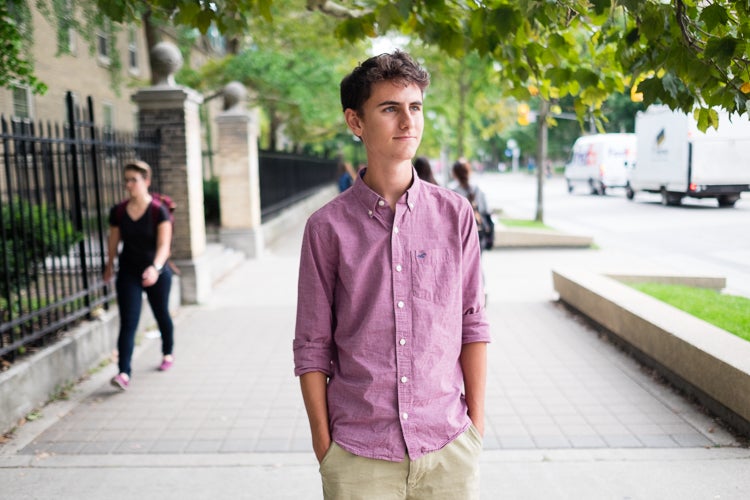
Markus Kunej, an engineering science student and Schulich Leader, on St. George Street (photo by Geoffrey Vendeville)
Markus Kunej found inspiration for an award-winnning science fair project through wanting to help his grandmother, Emmy Kurtz, who has glaucoma.
He developed a smart belt, which he called the Echo Belt, that helps visually impaired people navigate obstacles in 360 degrees. “It has sonar sensors on the outside and vibration motors on the inside, so it detects obstacles using the sensors and provides haptic feedback. The closer an object is in one direction, the stronger it vibrates,” he explains.
Kunej had the opportunity to test the belt at a school for the visually impared in his hometown of Brantford, Ont. “It's a nice feeling when you get to build something and see it help a group of people,” he says. “It reinforced the idea that I'd like to help the world in whatever way I can.”
When he got the email saying he had won a Schulich Leader Scholarship to study engineering science at U of T, he spat out his peanut butter-flavoured cereal in surprise, he says.
He has enjoyed building things since he was a boy playing with Lego and is keen on specializing in either robotics, aerospace or machine learning.
He wasted no time immersing himself in the U of T engineering community, taking a plunge in purple face paint with his fellow students during orientation.
“My nails have been a bit of a problem,” he says. “I put on clear nail polish as a trick to help make it come off, but I forgot to put some on my toes and they're going be purple for a couple of months.”
His first days among students in his program have been positive, he says. “The community seems awesome, especially in engineering science. It doesn't feel competitive within it. It feels like everyone's in it together and willing to help out.”



